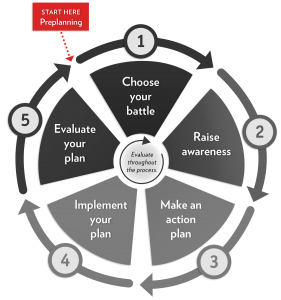 Pre-planning is an essential process to lay the groundwork for a Youth Advocates for Community Health project. It helps the group avoid issues that can derail youths’ best efforts later. Through pre-planning, the group establishes clear expectations about group behavior and a clear definition of the community they plan to serve. This is also a time for facilitators to build on their understanding of effective positive youth development strategies that can be used effectively throughout the project.
Pre-planning is an essential process to lay the groundwork for a Youth Advocates for Community Health project. It helps the group avoid issues that can derail youths’ best efforts later. Through pre-planning, the group establishes clear expectations about group behavior and a clear definition of the community they plan to serve. This is also a time for facilitators to build on their understanding of effective positive youth development strategies that can be used effectively throughout the project.
Watch the video below for a short overview of Pre-Planning.
In the Guidebook, facilitators will find the following:
- Simple strategies for empowering youth and leading youth-adult partnerships
- Important information about how team builders and reflection questions support the process
- Greater understanding of group development
- Team-building activities for fun and skill-building at every stage of group development
- Activities to build a strong foundation and common understanding upon which the later project is built
- Resources to help you and the youth you work with understand policy, systems, and environmental change
- The very first elements the youth need to build their action plan
Click the image at the right to download the Guidebook. ![]()
Supplemental Resources ![]()
The supplemental resources below support the downloadable Guidebook and are not intended to be used alone.
Handouts
Ladder of Youth Participation
Guidebook Activity: Youth Participation Ladder Opinion Line (page 12)
The Ladder of Youth Participation can be used to encourage youth and adults to examine why and how young people participate throughout communities.
Leadership Self-Assessment Form
Guidebook Activity: Strengths and Skills for Leadership (page 23)
The Leadership Self-Assessment Form can be used as a tool to help youth identify their leadership skills and identify the skills they want to further develop. The activity is from the Youth Engaged Learning about Leadership Curriculum (UW-Madison Division of Extension).
Videos for Understanding Policy, System, and Environment (PSE) Change
Guidebook Activity: Understanding Policy, System, and Environmental Change (page 21)
![]() Farm to School
Farm to School
From the kids’ point of view, this short entertaining video provides the what, why, how, and who of Farm to School to demonstrate how policies can impact behavior. Produced by Glory B. Media under the direction of Debra Eschmeyer for the National Farm to School Network.
![]() Smarter Lunchrooms
Smarter Lunchrooms
Paul Yettaw, Food Service Director, Marshall Public Schools shows off the changes they’ve made in the school’s cafeteria to improve the school lunch system.
![]() Gardening for Food Pantries
Gardening for Food Pantries
Iowa State University Extension and Outreach nutrition education programs, Master Gardener volunteers, and ISU Research and Demonstration Farms are working together on donation gardens throughout the state. They’re growing food for local pantries to help low-income Iowans access fresh fruits and vegetables. It’s an example of Iowans helping Iowans to increase food security.
![]() Social Marketing
Social Marketing
The Partnership for a Healthier America has united every type of fruit and veggie under one awesome brand: FNV. With a dash of playful creativity and boatloads of passion, FNV is harnessing the power of marketing to promote fruits and veggies in the same way big brands market their products.
![]() Healthy Retail
Healthy Retail
This video is an example of a healthy retail campaign to demonstrate how environmental conditions impact behaviors. Produced by Pickaxe Productions from El Diamante High School in partnership with California Department of Public Health and CA4Health.
![]() Complete Streets
Complete Streets
Day One youth advocates in El Monte created a video to showcase the need for policies to create safer and healthier environments for all users of the road.
Additional Resources
Youth Participatory Action Research
Youth Participatory Action Research Curriculum
A curriculum from the Institute for Community Research intended to be used as a tool to support the authentic engagement of young people in decision-making processes that affect their lives while helping youth-serving organizations integrate youth voice into their work in a meaningful way.
Team Building Tools and Resources
Forming, Storming Norming and Performing in groups
Bruce W. Tuckman produced one of the most quoted models of group development in the 1960s. This article considers his contribution and the model’s continuing use.
Youth Workin’ It
Everything you need to know to help your youth get through the different stages of youth groups.
The Big Book of Conflict-Resolution Games
Games can reveal real conflict—along with emotions, personalities, misunderstandings, and reactions. Through games, the team experiences conflict in a safe environment.



